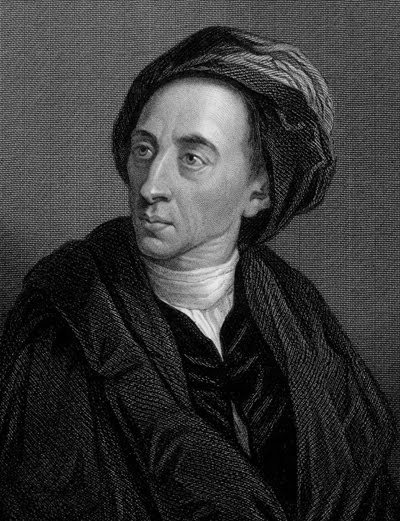Alexander Pope

21 May: AP born. His father, a linen-draper, is 42, his mother 46. Both are Roman Catholics, and his father, Alexander Sr., retires from business after his son's birth, because a new act of Parliament prohibited Catholics from living within ten miles of London.
AP is tutored at home by a priest, and then enrolled in two Catholic schools, but he is largely self-educated. Being RC, he is unable to attend University, or pursue a career in law or medicine or the Clergy. He can read Latin, Greek, French and Italian while still very young.
The Pope family moves out of London.
Contracts a tubercular bone disease, attributed at the time to his "perpetual application" to his studies. Attacks of this disease will recur at intervals throughout what he would refer to as "this long Disease, my Life." It leaves him frail, prone to various other illnesses, humpbacked, and permanently stunted: fully grown, he will attain a height of only four and one-half feet.
The "Pastorals," his first published works.
"Essay on Criticism" published anonymously. It is furiously attacked in print by John Dennis, a famous literary critic of the day whom AP satirizes in the poem. Dennis retaliates by referring to AP as a "hump-backed toad," but the "Essay" brings him to the attention of Swift, Addison, Gay, Parnell, Oxford, and Steele, all Tory members of the Martinus Scriblerus Club.
At the suggestion of John Caryll, a friend and a member of the circle of prominent Catholics which centered on the Englefields and the Blounts, AP writes and publishes the first version of "The Rape of the Lock," ostensibly to reconcile two prominent but feuding Catholic families.
Publishes a more complex version of "The Rape of the Lock."
Begins work on his verse translation of Homer's Iliad (which, with his translation of The Odyssey, written in collaboration with William Broome and Elijah Fenton, would be the great literary labor of his life) and which, published at intervals over the years, in six volumes, was also a great popular and financial success.
Collected Works, v. 1 published.
Father dies.
Leases the villa of Twickenham on the Thames near Richmond, where he moves with his widowed mother: Over the years he entertains his friends there, and oversees the construction of his famous grotto. He is the first author in English history to be able to sustain himself financially entirely on the profits derived from the publication of his own works.
Publishes his edition of Shakespeare's Works, and the first three volumes of his translation of The Odyssey also appear.
Final three volumes of The Odyssey published.
He and Swift publish the first two volumes of their Miscellanies, and AP himself works on his Dunciad.
The final volume of the Swift-Pope Miscellanies appears.
First three epistles of An Essay on Man are published anonymously.
Mother dies.
Fourth epistle of the Essay on Man appears, also anonymously.
Edmund Curll, perhaps (and this is saying a good deal) the most unscrupulous publisher of his day, brings out an expurgated and incomplete edition of AP's letters; an edition which appeared to be unauthorized. However, AP initiated the work himself, carefully edited all of the letters, and himself put them in Curll's hands.
Collected Works, v. 2 published.
AP produces an "authorized" version of his letters, and, when his authorship of the Essay on Man is acknowledged, he comes under vehement attack for the religious views he expressed there.
Final version of The Dunciad, in 4 volumes.
30 May: Dies at Twickenham.
As those move easiest who have learn'd to dance.
'Tis not enough no harshness gives offence —
The sound must seem an echo to the sense.